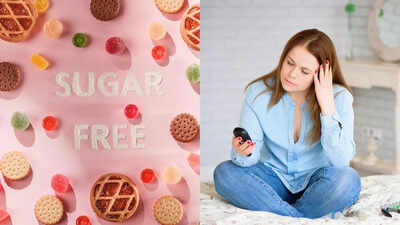ARTICLE AD BOX

Sugar substitutes can be beneficial for diabetics by helping manage blood sugar levels and reducing overall calorie intake. They offer a way to enjoy sweet flavors without the glucose spikes caused by regular sugar.
Options like stevia, erythritol, and monk fruit are generally considered safe and do not affect blood sugar significantly. However, some artificial sweeteners may impact gut health or trigger cravings for more sweets. It's important for diabetics to choose natural or well-studied substitutes and consume them in moderation. Consulting a healthcare provider is key to finding the best sugar alternative based on individual health needs.
Understanding sugar-free products and sugar substitutes for diabetics
The label “sugar-free” can be misleading. While it usually indicates that a product contains no added or refined sugars, it doesn't necessarily mean the item is carbohydrate-free, calorie-free, or safe for blood sugar levels.Many sugar-free foods still include sugar alcohols or starch-based ingredients that can raise blood glucose. This is why reading the full nutrition label is essential. Diabetics should check for total carbohydrates, fiber, and sugar alcohols, not just the sugar content.
Types of sugar substitutes
Sugar substitutes fall into two main categories: natural sweeteners and artificial sweeteners. Each has unique effects on the body, with different pros and cons.Natural sweeteners
- Stevia: A zero-calorie plant extract that does not raise blood glucose levels. It may also help improve insulin sensitivity.
- Monk Fruit: Derived from a small melon, this sweetener is much sweeter than sugar but contains no calories or carbohydrates.
- Erythritol and Xylitol: These sugar alcohols contain fewer calories than sugar and have minimal impact on blood sugar. However, they may cause digestive discomfort if consumed in large amounts.
Artificial sweetenersAspartame, Sucralose, Saccharin, Acesulfame-KThese are synthetic sweeteners, intensely sweet with little to no calories. They generally do not raise blood glucose, making them popular among diabetics.However, some research raises concerns about long-term use, suggesting possible effects on metabolism, gut health, and insulin resistance.
Benefits of sugar-free products for diabetics
When chosen carefully, sugar-free products can offer several benefits for people with diabetes:1. Blood sugar managementSugar substitutes typically have low or zero glycemic indexes, meaning they don't cause sudden spikes in blood sugar. This is helpful in maintaining stable glucose levels.2. Calorie reductionMany sugar-free sweeteners are non-caloric, helping people reduce overall calorie intake, which is essential for weight management and metabolic control.3. Supporting weight lossLower calorie intake can support healthy weight loss, which is often recommended for type 2 diabetes management. Weight reduction improves insulin sensitivity and reduces the need for medication in many cases.4. Curbing sugar cravingsSugar-free products can help reduce sweet cravings, making it easier to stick to a diabetic-friendly diet. They offer a satisfying taste without the sugar rush (or crash).
Potential risks and drawbacks of sugar substitutes
Despite the benefits, sugar-free products are not a “get out of jail free” card.
There are important caveats diabetics should be aware of.1. OverconsumptionBecause these products are labeled “sugar-free,” people may assume they are healthy in unlimited quantities. But some contain hidden carbs, unhealthy fats, or artificial additives that may have negative effects on metabolism.2. Digestive issuesSome sugar alcohols, especially sorbitol or maltitol, can cause bloating, gas, or diarrhea when consumed in large amounts.3. Possible impact on insulin responseSome studies suggest that certain artificial sweeteners may interfere with insulin sensitivity, increase appetite, or affect glucose metabolism—potentially leading to weight gain or worsened diabetes control in the long term.4. Gut health disruption There is growing concern that artificial sweeteners may alter the gut microbiome, which plays a vital role in immune function, digestion, and blood sugar regulation.
How to choose the right sugar substitute
Here are some practical tips for diabetics looking to include sugar-free products safely in their diets:
- Stick to natural options: Opt for natural sweeteners like stevia or monk fruit, which are generally safer and better tolerated.
- Check the labels: Always read the ingredient list and nutrition facts. Avoid products with added starches or high total carb content.
- Watch the serving size: Even sugar-free products can add up in calories and carbs if consumed in large amounts.
- Limit artificial sweeteners: Use artificial sweeteners sparingly and avoid consuming them multiple times a day.
- Monitor your body’s response: Everyone responds differently. Track your blood sugar after trying new products to see how your body reacts.
Lifestyle matters
It’s important to remember that sugar-free foods are just one tool in diabetes management. They cannot replace a healthy, balanced diet, regular physical activity, proper hydration, and consistent medical care.A diet rich in whole foods, including vegetables, lean proteins, whole grains, healthy fats, and low-glycemic fruits, will always outperform one focused on sugar-free processed snacksAlso read | How Hepatitis D virus can cause liver cancer: Know its symptoms, risks, causes, and more



.png)
.png)
.png)
















 3 hours ago
2
3 hours ago
2









 English (US) ·
English (US) ·